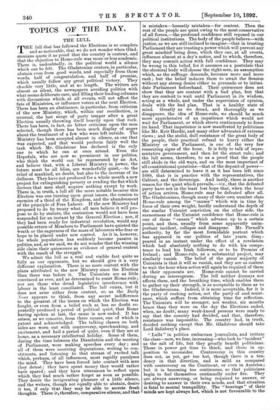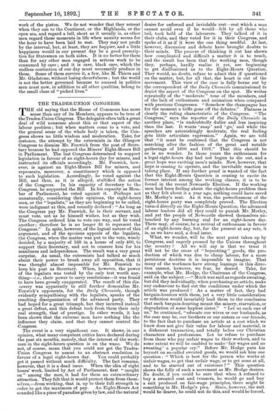TOPICS OF THE DAY.
THE LULL. THE lull that has followed the Elections is so complete and so noticeable, that we do not wonder when Glad- stonians quote it as proof that the country is content, and that the objection to Home-rule was more or less academic. There is, undoubtedly, in the political world a silence which can be felt. The Gladstonian orators, in particular, abstain even from good words, and especially from those words, half of congratulation, and half of promise, which usually follow any great political victory. They chuckle very little, and at no length. The writers are almost as silent, the newspapers avoiding politics with what seems deliberate care, and filling their leading columns with discussions which, at all events, will not affect the fate of Ministries, or influence voters at the next Election. There has been an abstinence, in particular, from criticism of the new Ministry, which, within our recollection, is unusual, the last surge of party temper after a great Election usually throwing itself heavily upon that rock. There has been, in fact, no bitter criticism upon the men selected, though there has been much display of anger about the treatment of a few who were left outside. The Ministry has been accepted almost in silence, as one that was expected, and that would perform fairly well the task which Mr. Gladstone has declared is the only one to which he can at once attend. Even the Hopefuls, who are now so prominent in our politics, who think the world can be regenerated by an Act, and believe that, with a Liberal Ministry in power, the future must be all bliss, are wonderfully quiet,—to the relief of mankind, no doubt, but also to the increase of its dullness. They have not produced for a whole month a new project for extinguishing poverty or evading the fiat which decrees that men shall acquire nothing except by work. There is, in truth, a lull all the more notable because this Election was one turning upon great issues, the cession to enemies of a third of the Kingdom, and the abandonment of the principle of Free Labour. If the new Ministry had proposed to do by treaty what all men believe it will pro- pose to do by statute, the contention would not have been suspended for an instant by the General Election ; nor, if they had been ready for industrial revolution, would any possible return of Members to Parliament have quieted the wrath or the eagerness of the mass of labourers who fear or hope to be placed under new control. As it is, however, the whole population has suddenly become passive in politics, and, as we said, we do not wonder that the winning side claim their quiescence as evidence of general content with the result of the struggle. We admit the lull as a real and visible fact quite as fully as our opponents, but we should give it a very different explanation. There is no more content with the plans attributed to the new Ministry since the Election than there was before it. The Unionists are as little convinced as ever, and as determined to resist Home-rule; nor are those who dread legislative interference with labour in the least conciliated. The lull exists, but it does not arise either from content, or, as the Daily News appears to think, from any secret indifference to the greatest of the issues on which the Election was fought, or even from a belief such as has no doubt re- peatedly produced a period of political quiet, that Rome having spoken at last, the cause is now ended. It has arisen, as we conceive, from three causes, one of which is patent and acknowledged. The talking classes on both sides are worn out with controversy, speechmaking, and excitement, and hail a period of quiet, even if they are at home, as a necessary intellectual holiday. Some of them, during the time between the Dissolution and the meeting of Parliament, were making speeches every day ; and all of them were receiving deputations, writing to con- stituents, and listening to that stream of excited talk which, perhaps, of all influences, most rapidly paralyses the mind. They have been forced into contact with men they detest ; they have spent money they would rather have spared ; and they have utterances to reflect upon which they had much rather forget as soon as possible. They desire the invigorating pleasure of a little silence, and the writers, though not equally able to abstain, desire it too, if only that they may be able to secrete fresh thoughts. There is, therefore, comparative silence, and that is mistaken—honestly mistaken—for content. Then the rest of the people are quiet owing to the most conservative of all forces,—the profound confidence still reposed in our political institutions. The body of the people believe—with justice, as we are still inclined to imagine—that in trusting Parliament they are trusting a power which will prevent any great mischief being done, which they can, at all events, influence almost at a day's notice, and to which, therefore, they may commit action with full confidence. They may be wrong in this belief, for it assumes as a postulate that the electoral body will choose the right men, an assumption which, as the suffrage descends, becomes more and more rash ; but the belief induces them to await the Session without any strong desire either to persuade or to intimi- date Parliament beforehand. Their quiescence does not show that they are content with a bad plan, but that they are content to wait until Parliament in its wisdom, acting as a whole, and under the supervision of opinion, deals with the bad plan. That is a healthy state of mind. Greatly as we dread, and thoroughly as we disapprove, the idea of Home-rule, we should be much more apprehensive of an impatience which would not wait for Parliament, or which strove continuously to force its hand. That impatience is now manifested by politicians like Mr. Keir Hardie, and many other advocates of extreme views ; and the stolid, dull resistance of the great body of the people, their practical refusal to hurry either the Ministry or the Parliament, is one of the very few reassuring signs of the hour. It is folly to talk of repre- sentative government, and then let the street rule ; and the lull seems, therefore, to us a proof that the people still abide in the old ways, and on the most important of all constitutional questions—that of the deposit of power— are still determined to leave it as it has been left since 1688, that is in practice with the representatives, the Cabinet, and the Sovereign. And lastly, there is another reason for the quiet which prevails,—viz., that the defeated party have not in the least lost hope that, when the hour of action arrives, Home-rule may be defeated after all. The Gladstonians, though many of their own number class Home-rule among the " causes " which win in time by force of their own weight, hardly understand the depth of the similar Unionist conviction on the other side, the earnestness of the Unionist confidence that Home-rule is one of those " causes " which advance up to a certain point, and then, usually from some apparently unim- portant incident, collapse and disappear. Mr. Parnell's authority, by far the most formidable portent which has appeared in our politics of late years, disai - peered in an instant under the effect of a revelation which had absolutely nothing to do with his compe- tence to lead his Irish followers, or to be Premier of Ireland ; and Home-rule, as a substantial project, may similarly vanish. The belief of the great majority of Unionists is that it will so vanish, and they are as content to wait the hour when action will again be required of them as their opponents are. Home-rule cannot be carried. during an interregnum. The lull neither dismays nor affects them, and the breathing time, which enables them to gather up their strength, is as acceptable to them as to the Gladstonians. Indeed, it is more acceptable, for it is the party of rushing action, not the party of cool resist- ance, which suffers from obtaining time for reflection.
The Unionists will be stronger, not weaker, six months hence than they were on the clay the Elections ended, when, no doubt, many weak-kneed persons were ready to say that the country had decided, and that, therefore, resistance was impossible. The country had, in truth, decided nothing except that Mr. Gladstone should take Lord Salisbury's place.
" Lulls " in politics embarrass journalists, and irritate the class—now, we fear, increasing—who look to "incident" as the salt of life, but they greatly benefit politicians. Those in power get time to think, and those in op- position to reconsider. Controversy in this country does not, as yet, get too hot, though there is a ten- dency in that direction, and is mild as compared with controversy on the Continent, or even in America; but it is becoming too continuous, so that politicians begin to feel themselves continually under fire. They are always answering, or being required to answer, or desiring to answer in their own minds, and that situation is fatal to mental tranquillity. The " bearings " of their minds are kept always hot, which is not favourable to the work of the piston. We do not wonder that they retreat when they can to the Continent, or the Highlands, or the open sea, and regard a lull, short as it usually is, as other men regard those moments in life when anxiety seems for the hour to have been laid to rest. They may not profit by the interval, but, at least, they are happier, and a little happiness would in our present day be a good prescrip- tion for Statesmen on both sides. It is no better for them than for any other men engaged in serious work to be consumed by care ; and it is care, black care, which the endless contention of our day must necessarily produce in them. Some of them survive it, a few, like M. Thiers and Mr. Gladstone, without losing cheerfulness ; but the world is not the better governed because to succeed in politics men must now, in addition to all other qualities, belong to the small class of " picked lives."



































 Previous page
Previous page